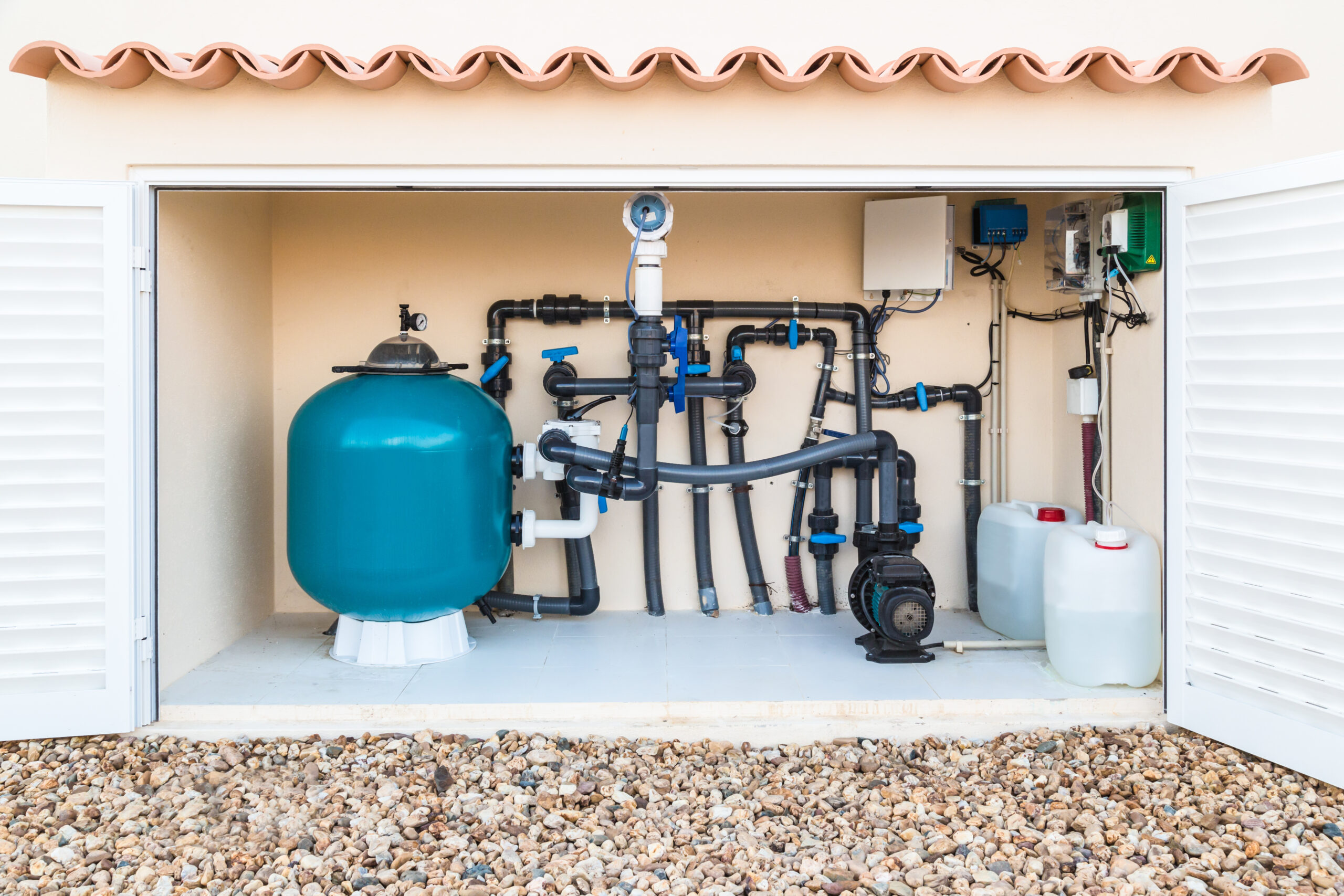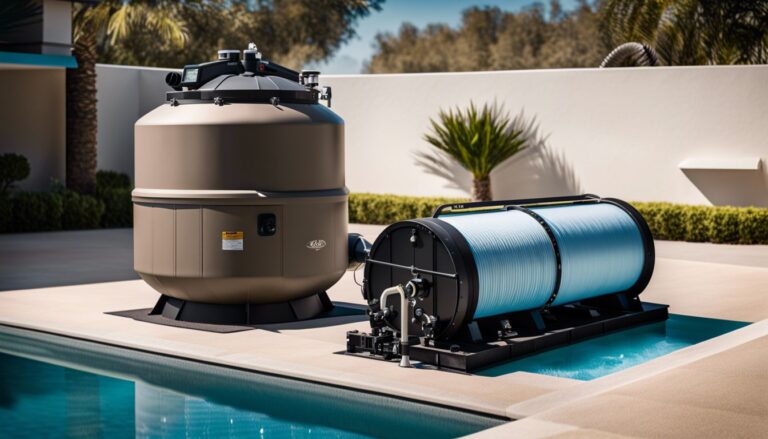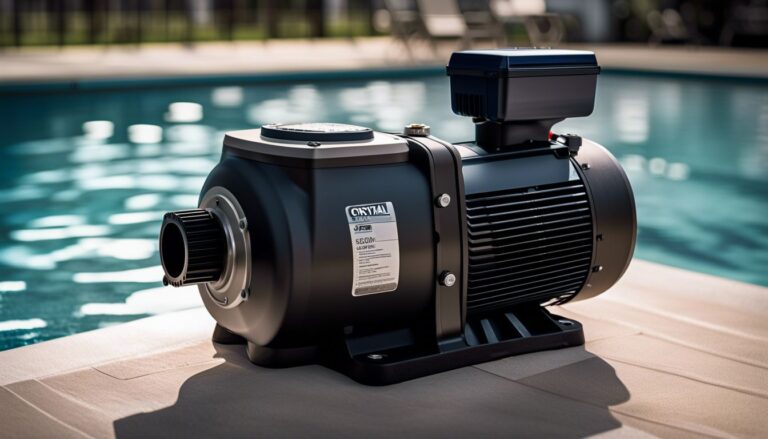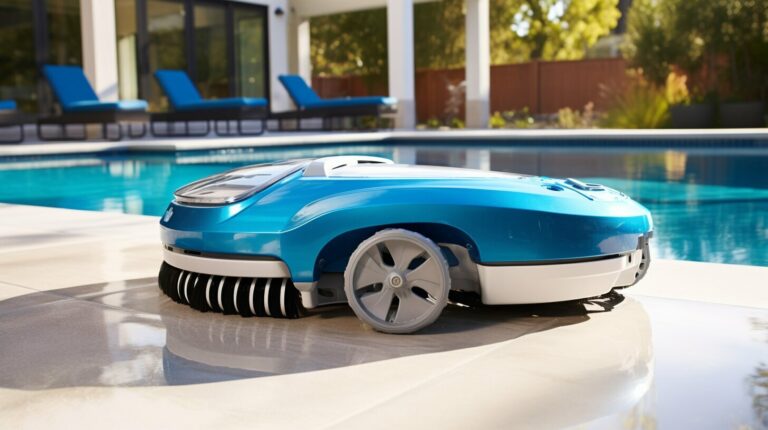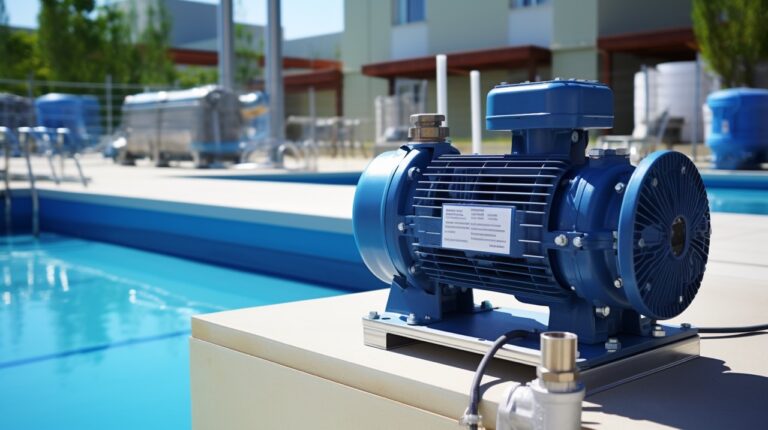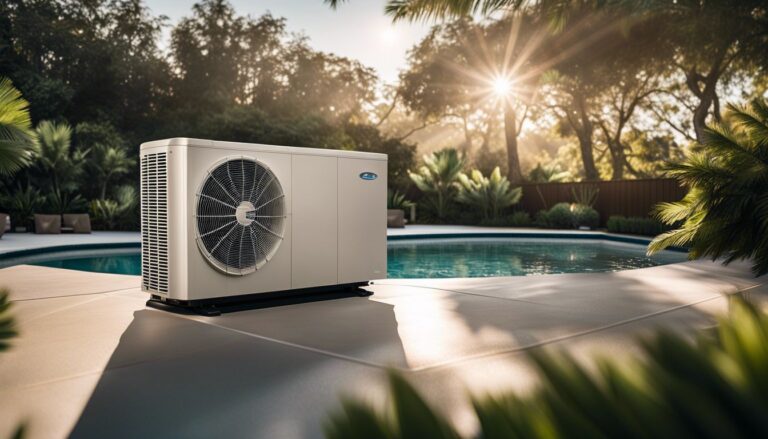Salt Water Pool vs Chlorine vs Ozone: What’s Best in 2023?
Dive into the Ultimate Pool Showdown: Salt Water Pool vs. Chlorine vs. Ozone
It’s a sweltering summer day, and you dream of taking a refreshing dip in your backyard dream pool. But before diving headfirst into pool ownership, there’s a crucial decision: which type of pool system should you choose?
A Salt water pool vs chlorine vs ozone systems have unique benefits and drawbacks, and the best choice for you depends on factors like budget, maintenance preferences, and environmental impact. In this article, we’ll plunge into the pros and cons of each system, so you can confidently make the best decision for your aquatic retreat. Let’s dive in.
Post Summary: When building our pool, one of the top questions was a salt water pool vs chlorine vs ozone. Salt water and chlorine are the most common, with chlorine being the cheapest up front, but more work over the life of the pool. After research on various pool sanitation options, I found that salt water systems offer many benefits over traditional chlorine systems. I ultimately decided to use a salt water system for my recent pool build, since it provides a more comfortable swimming experience, requires fewer harsh chemicals, and helps to reduce the risk of harmful bacterias. Additionally, salt water pools have gained popularity in recent years due to their more natural and gentle approach to pool care. Read on to find out more!
The Battle of Pool Systems: A Comparative Dive
Salt Water Pools: A Wave of Benefits for Pool Owners
Riding the Salty Tide: How Salt Systems Work
While swimming in a saltwater pool might conjure images of frolicking in the ocean, the reality is quite different. Salt water pools rely on a salt chlorine generator, transforming sodium chloride (salt) into hypochlorous acid – the same sanitizing agent in regular chlorine. The generator’s salt cell works magic by electrolyzing the salt, producing just the right amount of chlorine to keep your pool crystal clear and sparkling clean.
To understand the difference between saltwater pools and ocean water, consider the disparity in salt concentrations. This distinction greatly impacts the swimming experience and maintenance requirements for saltwater pools.
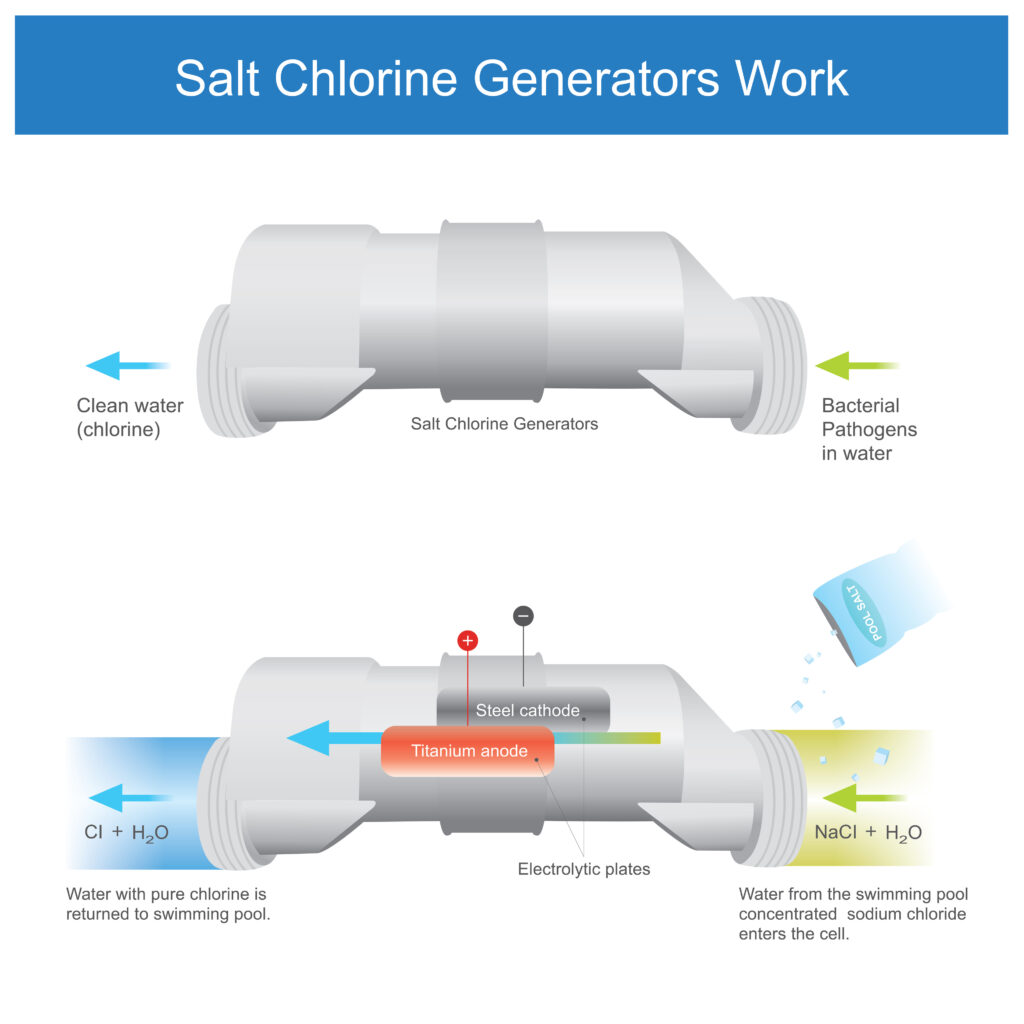
Salt concentrations in saltwater pools typically range between 2,500 and 3,500 parts per million (ppm). This salinity level allows the salt chlorine generator to convert sodium chloride into chlorine effectively, ensuring your pool stays sanitized. The lower salt levels in saltwater pools lead to a more comfortable swimming experience, with reduced skin and eye irritation compared to traditionally chlorinated pools. Plus, the slightly salty water feels softer on the skin, offering a more enjoyable and natural swimming sensation.
On the other hand, ocean water boasts a much higher salt concentration, averaging around 35,000 ppm. This salinity level is approximately ten times higher than a saltwater pool. Swimming in ocean water can sometimes result in skin and eye irritation due to the high salt content. Moreover, the salt levels in ocean water create a buoyancy effect, making it easier to float.
Salt System Levels and Maintenance
A saltwater pool system requires regular maintenance but is typically less labor-intensive than traditional chlorine pools. You must monitor and adjust the salt, pH, and alkalinity levels to keep your pool in tip-top shape. Additionally, depending on usage and maintenance practices, you’ll need to clean and replace the salt cell every 3 to 7 years.
| Pool Type | Pros | Cons |
|---|---|---|
| Traditional Chlorine Pools |
|
|
| Saltwater Pools |
|
|
| Ozone Pool Systems |
|
|
The Advantages of Saltwater Residential Pools
The Advantages of Saltwater Residential Pools
A Softer, Gentler Swim: Saltwater systems are highly regarded for their reduced chlorine production, which results in a more pleasant swimming experience. With saltwater pools, swimmers can enjoy a gentler effect on their skin and eyes, while also eliminating the infamous chlorine odor that is often associated with traditional pools.
Fewer Harsh Chemicals, Happier Swimmers: One of the most significant benefits of saltwater pools is the decreased reliance on harsh chemicals for water treatment. Using a salt chlorine generator, the system continuously converts salt into chlorine steadily, maintaining a proper sanitizer level without requiring frequent chemical additions. This leads to a more comfortable swimming environment and a safer and healthier pool experience for swimmers of all ages.
The Advantages of Ozone Residential Pools
Enhanced Water Quality: Ozone pool systems are renowned for their superior water quality, delivering crystal-clear, pristine water that surpasses other sanitization methods. By effectively oxidizing and eliminating organic and inorganic contaminants, ozone systems ensure a safer and more pleasurable swimming experience for pool users.
Reduced Chemical Usage: A significant advantage of ozone systems is the substantial reduction in chemical usage compared to traditional chlorine and saltwater pools. Ozone eliminates the need for constant additions of chlorine or other chemicals, resulting in a more environmentally friendly and cost-effective approach to pool maintenance.
Extended Equipment Lifespan: Ozone’s less corrosive nature compared to standard chlorine extends the lifespan of pool equipment, requiring less frequent replacement. This leads to decreased long-term expenses and a reduced environmental impact due to lower waste generation, ultimately contributing to a more sustainable pool management solution.
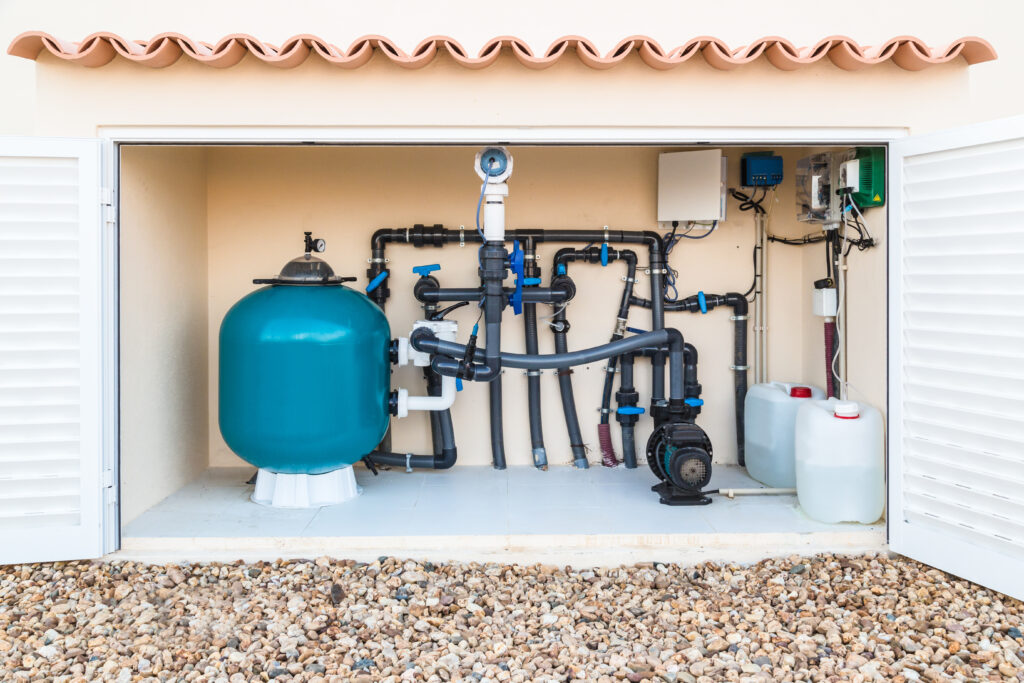
Comparing the Three Pool Types: Maintenance Requirements
Ozone Pools
Ozone pools require less maintenance compared to saltwater and traditional chlorine pools. With the reduced need for chemical additions and the system’s ability to maintain consistent water quality, pool owners can spend more time enjoying their pool and less time on upkeep.
Salt Water Pools
Saltwater pools also require less maintenance than traditional chlorine pools. However, the salt chlorine generator needs regular cleaning to remove any buildup, and salt levels need to be monitored and adjusted as necessary.
Traditional Chlorine Pools
Of the three types, traditional chlorine pools require the most maintenance. Frequent monitoring and adjustment of chemical levels are necessary to maintain water quality and prevent algae growth. This can be time-consuming and may require additional chemicals to maintain balance.
Comfort Levels
Saltwater Pools
Swimming in a saltwater pool is often more comfortable for swimmers, as the lower chlorine levels lead to less skin and eye irritation. The slightly salty water also feels softer on the skin, giving a more natural and pleasant swimming experience.
Traditional Chlorine Pools
The higher chlorine levels in traditional pools can cause red eyes, skin irritation, and that distinctive chlorine smell, which may be off-putting for some swimmers.
Salt Water Pool vs Chlorine Vs Ozone Environmental Considerations
Saltwater Pools
Since saltwater systems generate their chlorine and require fewer additional chemicals, they have a lower environmental impact than traditional chlorine pools. This reduced chemical usage can positively affect the watershed area surrounding your pool, with fewer chemicals being released into the environment through backwashing or other pool maintenance activities.
Traditional Chlorine Pools
Chlorine production and disposal can have a negative environmental impact, particularly in the watershed surrounding your pool. The use of additional chemicals, like cyanuric acid, also contributes to the environmental concerns associated with traditional chlorine pools.
Chemical Reduction
Ozone Pools: Ozone systems dramatically decrease the need for chlorine and other harsh chemicals, resulting in a healthier pool environment with less risk of red eyes, skin irritation, and chemical smells. This reduction in chemical use makes ozone pools a more eco-friendly option.
Salt Water Pools: Saltwater systems also use less chlorine than traditional chlorine pools, as the salt generator continuously produces chlorine. However, they require chemical additions and adjustments to maintain balanced water chemistry.
Traditional Chlorine Pools: In comparison, traditional chlorine pools require the most frequent chemical additions and adjustments, including chlorine tablets or liquid chlorine, as well as other balancing chemicals.
Clarity and Quality
Ozone Pools: Ozone is a powerful oxidizer, breaking down organic matter and other contaminants that can cloud your pool water. This results in sparkling, crystal-clear water that’s inviting for swimmers.
Salt Water Pools: Saltwater pools also offer clear water, with the salt chlorine generator maintaining proper chlorine levels to keep your pool looking its best. However, they may not achieve the same level of water clarity as ozone pools.
Traditional Chlorine Pools: Water clarity in traditional chlorine pools can be more challenging to maintain, requiring frequent chemical adjustments and treatments to keep the pool clean and clear.
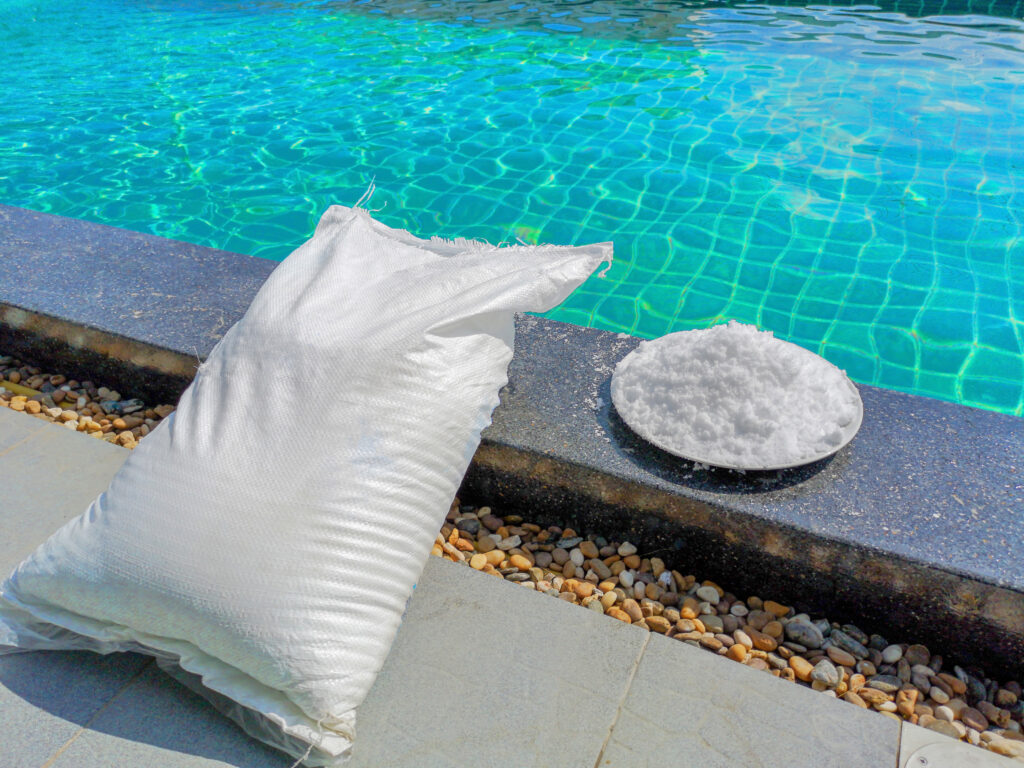
Health Considerations
Ozone Pools: With fewer harsh chemicals, ozone pools provide a healthier swimming environment, reducing the risk of skin and eye irritation and other health concerns associated with high chlorine levels, such as respiratory issues or even links to certain cancers like breast cancer.
Salt Water Pools: Saltwater pools also offer a healthier swimming experience, as the lower chlorine levels lead to less skin and eye irritation. However, they still contain some chlorine, which may concern those with chlorine sensitivities or specific health concerns.
Traditional Chlorine Pools: Traditional chlorine pools have the highest concentration of chemicals, which may lead to skin and eye irritation and other health concerns related to exposure to high chlorine levels. Swimmers with chlorine sensitivities or specific health concerns may find traditional chlorine pools less suitable for their needs.
Cost Considerations
Ozone Pools: While the initial investment in an ozone pool system can be higher than that of a saltwater or traditional chlorine pool, the reduced need for chemicals, less frequent maintenance, and longer-lasting pool equipment can make it a more cost-effective long-term option.
Salt Water Pools: Saltwater pool systems have a moderate initial cost, requiring a salt chlorine generator. However, the reduced need for chemicals and less frequent maintenance can lower operating costs than traditional chlorine pools.
Traditional Chlorine Pools: Traditional chlorine pools often have the lowest initial cost. Still, they may incur higher ongoing expenses due to the need for frequent chemical additions, maintenance, and potential equipment replacement resulting from the corrosive effects of chlorine.
FAQ
What is the difference between a salt water pool and a traditional chlorine system?
Salt water pools use salt chlorine generators to convert salt into chlorine, while traditional chlorine systems manually add chlorine through chlorine tabs, liquid, or powder. Salt water systems typically provide a more comfortable swimming experience, with gentler water and fewer chemicals.
What is galvanic corrosion, and how does it affect salt water systems?
Galvanic corrosion occurs when two dissimilar metals come into contact in an electrolyte-rich environment, such as salt water pools. This can cause damage to pool equipment and fittings, especially those made of metal. Proper grounding and sacrificial anodes can help prevent this corrosion in salt water systems.
How does a UV lamp help with pool sanitation?
UV lamps emit ultraviolet light that targets and neutralizes organic contaminants such as bacteria, algae, and viruses. This process helps reduce the need for high chlorine levels, improving water quality and reducing the risk of harmful bacterias in the pool.
Are in ground pools a good choice for salt water systems?
In the ground, pools can be an excellent choice for saltwater systems. However, it’s important to ensure that all materials used in the pool’s construction, including metal components, are compatible with salt water to prevent galvanic corrosion.
What makes an oxidizing agent effective in pool sanitation?
An oxidizing agent, such as ozone or chlorine, is a powerful sanitizer that breaks down organic contaminants and neutralizes harmful microorganisms. The oxidation process leaves the pool water cleaner, reducing the need for high chlorine levels and making it a safer and more enjoyable swimming environment.
How often should I check and adjust the chlorine level in my pool?
The frequency of checking and adjusting chlorine levels depends on factors such as pool usage, weather, and water quality. Typically, testing and adjusting the chlorine levels at least once a week for residential pools is a good idea. However, more frequent testing may be required during heavy use or after heavy rainfall.
What is the role of filtration systems in maintaining a healthy swimming pool?
Filtration systems are crucial in maintaining a clean and healthy pool environment. They work by circulating water through a filter, capturing and removing debris and contaminants from the water. This helps maintain water clarity, reduces the growth of algae and bacteria, and improves the overall effectiveness of the pool’s sanitation system.
What are salt chlorine generators, and how do they work in saltwater pools?
Salt chlorine generators convert salt into chlorine for water treatment in saltwater pools. They use electrolysis to create chlorine gas from dissolved salt in the pool water, providing continuous sanitization.
How do ozone gas, UV systems, and electrical discharge contribute to pool sanitation?
Ozone generators, such as corona discharge ozonation or UV systems, produce ozone gas. The high voltage electrical discharge in a corona discharge ozonator splits oxygen atoms, forming ozone molecules. UV systems use ultraviolet light to create ozone gas and directly inactivate harmful organisms.
What are the benefits of a salt pool compared to a traditional chlorine system?
Salt pools provide a more comfortable swimming experience, with less skin and eye irritation, lower levels of chlorine smell, and reduced chemical usage. However, they may require careful maintenance of the salt chlorine generator and have a moderate environmental impact.
Why has the popularity of ozone pools increased in recent years in North America?
In recent years, ozone pools have gained popularity due to their superior water quality, lower environmental impact, and reduced chemical usage. While they may have higher initial costs, the long-term savings on chemicals and extended equipment life make them a cost-effective option.
How does a CD ozone generator differ from a UV ozone generator?
A CD (corona discharge) ozone generator uses high-voltage electrical discharge to split oxygen atoms and create ozone molecules. In contrast, a UV (ultraviolet) ozone generator utilizes UV light to directly produce ozone gas and inactivate harmful organisms.
What are the key factors when choosing the best option for a new pool sanitation system?
When selecting a new pool sanitation system, consider water quality, comfort, environmental impact, initial and ongoing costs, and maintenance requirements. Consult with pool professionals to help determine the best option for your specific needs and preferences.
How does a pool ozone generator work with the pool pump and circulation system?
A pool ozone generator typically integrates with the pool pump and circulation system through venturi injection. As water passes through the circulation system, ozone gas is injected, mixing with the pool water and providing powerful oxidation and sanitization.
Is residual sanitizer, like free chlorine, necessary in ozone and UV-sanitized pools?
Yes, residual sanitizer, such as free chlorine, is essential in ozone and UV sanitized pools. Ozone and UV systems rapidly inactivate harmful organisms but don’t provide long-lasting protection. A residual sanitizer maintains a safe pool environment between sanitation cycles.
What is the role of pH levels in maintaining a healthy swimming pool?
Maintaining proper pH levels in your pool is crucial for effective sanitization, as it impacts the efficiency of chlorine demand and other sanitizers. Additionally, balanced pH levels help prevent corrosion, scaling, and algae growth, ensuring a safe and comfortable swimming experience.
How do ozone and UV systems compare to conventional pools regarding water purification and level of chlorine usage?
Ozone and UV systems significantly reduce the need for as much chlorine in pools, providing superior water purification with fewer chemicals.
Conclusion
The debate between saltwater, traditional chlorine, and ozone pools is multifaceted, with each system presenting its unique advantages and disadvantages. Ultimately, the choice will depend on the priorities of the pool owner. Factors such as maintenance, comfort, environmental impact, water clarity, health considerations, and cost should all be weighed when deciding. It is essential to carefully assess your needs and preferences to determine the most suitable pool system for your home or facility.
